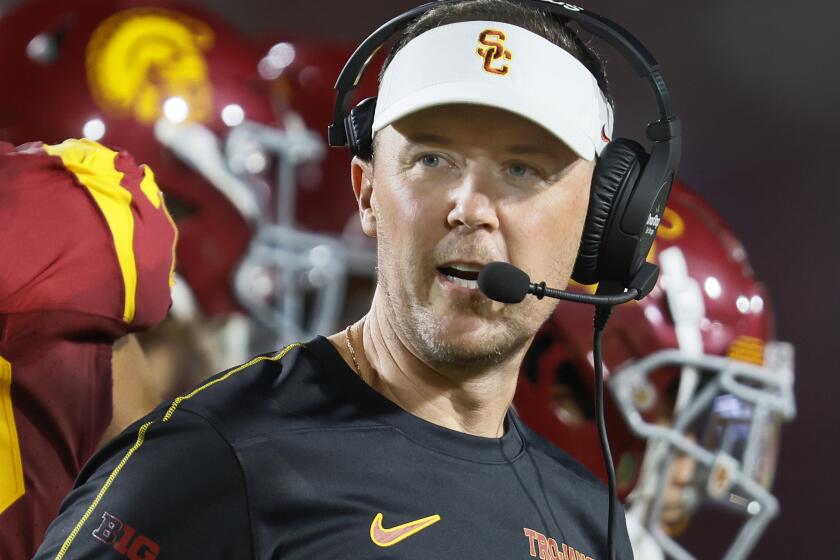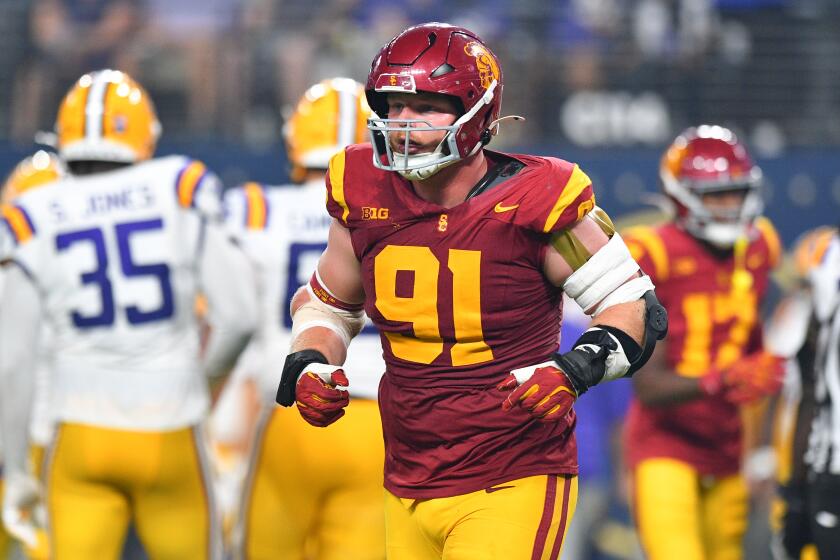One for the home team
Four days before Christmas, and the bare fir sits in the middle of the cluttered living room, undecorated, unlighted, no presents, the only music coming from sirens that rattle the thin walls.
On one couch sits a housewife, lips pursed, one leg elevated and swollen, a woman battling various debilitating illnesses.
On another couch sits her husband, his fingers trembling, his head adorned with a Santa hat that belies the joylessness of Parkinson’s disease.
Outside their Boyle Heights project apartment are roaming gangs, one of which recently attempted to rob them between Thanksgiving dinner and dessert.
In the middle of it all sits the youngest son, built so thickly the couch sags under his weight, a USC fullback who carries far more than a football.
His name is Jody Adewale, and when you ask about the lack of Christmas tree lights, they point to him.
“He is our shining angel,” says his mother, Linda.
When you ask about the lack of presents, they again point to him.
“He is our gift from God,” says his father, Sunday.
In four years at USC, Adewale has zero rushing attempts, three pass receptions, 32 total yards. But during that time, no Trojan has shouldered more hopes or covered more ground.
Because, while playing for one of the nation’s premier college football teams, he has also had to prop up his own poverty-stricken family.
For four years, he has kept one foot in the bright lights and another foot in Boyle Heights, straddling the line between this city’s shiniest and bleakest.
When this Roosevelt High star became one of the few East Los Angeles athletes since Mike Garrett to earn a paid journey to USC, little did he know that he would spend the next four years repeating that trip again and again on a near-daily basis.
When Adewale is not on the field earning his scholarship stipend, he’s giving big chunks of that money to his parents for their rent.
When he’s not eating at the team training table, he carries leftover food home in his pockets.
When he’s finished dressing in the locker room, he picks the discarded T-shirts and sweat pants and brings them home for clothing.
When he’s not taking advantage of the luxuries of normal college life, he’s sharing them with his family, supplying them with everything from stray rolls of toilet paper to free dental-school toothbrushes.
More than all this, Jody Adewale has spent four years giving them himself.
He regularly drives home after practice to clean house or do laundry. He has often hurriedly left campus to drive his father to work, drive his mother to doctor’s appointments, drive his brother to court.
Then, last season, amid the unimaginable pressure of playing for one of the best regular-season teams in college football history, Adewale did the unthinkable -- he moved home so he could better care for everyone there.
Unbeknownst to his coaches, for the entire season he slept in a tiny bedroom in the unheated apartment so he could care for his family when he wasn’t at school.
“I can’t imagine anybody else doing what he did,” says teammate Mike Brittingham. “To try and play football while living in that environment ... I don’t know how he survived it.”
He almost didn’t, his devotion to home tugging so strongly at his devotion to football that it nearly tackled him for good.
“One time he called from a bus and was almost crying,” says his sister Scarlett. “He was saying, ‘Why does it have to be so hard for me? Why?’ ”
Yet, he continues to stay close, even as circumstances threatened to push him farther away.
Early in his college career, he was told by some USC coaches that he should transfer to a smaller school. He refused.
“I knew I would never get any playing time at USC, it would be hard my whole career,” Adewale says. “But I couldn’t leave my family alone.”
His older brother and sister finally moved back home this year so he could finish his final season in relative peace. Yet cars still break down, rents are still due and clothes need washing, and he still comes home a couple of times a week, even if it means sleeping on that saggy couch.
“I do this because I owe them,” Adewale says of his family. “Each of them gave me something when I was growing up. They allowed me to get out of Boyle Heights and come to the greatest college in the world. It’s my duty to pay them back.”
The payment isn’t always high, but it’s always him.
His holiday gifts for his family, for example, often include souvenir watches and T-shirts and gym bags.
“Bowl game freebies for the rest of our players,” he says with a grin. “Christmas presents from me.”
*
Shortly after Jody Adewale received a scholarship from USC, his father sought out Pete Carroll in the Trojans locker room.
Sunday Adewale, a Nigerian immigrant, dropped to his knees and hugged Carroll’s feet.
“I was thanking Coach Carroll for this gift from God, this chance for my son to do something that nobody in this family has ever done,” Sunday recalls.
It was a gift Adewale immediately decided he would use differently than most big-time college athletes.
“I look at it like, I’m making $50,000 a year and getting a great education,” he says. “I can become a man. I can help my family. It’s the deal of the year.”
The first phone calls arrived shortly after he came to campus.
“Jody!” his mother said on the other end. “I need you!”
So he would catch a ride home and help her cook or clean.
The phone calls came several times a day, many times a week, his family needing money or food or just support.
“He could never just sit around after practice, he was always jumping up and taking off,” said Brittingham. “Then he’d come back with some amazing story that none of us could believe.”
He would rush to the courthouse to deal with his brother’s traffic tickets. He would rush to a Boyle Heights laundromat to deal with his family’s clothes.
Once, when his father grew ill and Adewale couldn’t find a ride, he sat in the library in tears. Other times, he nearly cried because he felt so besieged.
He once refused to answer their calls for a week, but then relented in time to drive home to hand his father a rent check.
“What he was doing was almost impossible for a kid his age,” says Jose Casagran, Adewale’s high school coach. “He’d come back to Boyle Heights and all this home pressure, his parents needing him for something, people asking why he wasn’t playing. Then he’d turn around and go back to USC and all that football pressure.”
After he scraped together enough money to buy a rusted car, Adewale decided the commute was too tough, so he moved home for the 2005 season.
While Matt Leinart and Reggie Bush were making headlines, Adewale was making oatmeal for his parents’ breakfast. While Leinart and Bush were attending late-night parties and premieres in fancy winter clothing, Adewale was sleeping in his tiny childhood bedroom in layers of USC sweats.
He would wake up early and take his father to his social-work job near the USC campus. He would attend school and practice, then meet his father outside Heritage Hall after training table. He would give his father a leftover sandwich, then drive him home.
Later, with the sounds of gunshots and sirens outside making studying in his room difficult, he would return to the USC library, where he would remain until returning home after midnight.
When asked if he thinks that taking food or toilet paper was unethical or even illegal, he shakes his head.
“I wasn’t trying to hurt anybody,” he says. “I was just trying to help my family.”
While his face remains soft, his eyes have grown tired. He is one of the most optimistic of USC players, his voice light and his words hopeful. But he is also, clearly, one of the most weary.
“It was a massive strain on him,” says his brother Gabriel. “He was depressed every day. I’m like, ‘Oh my Lord, what is this doing to him?’ ”
Through it all, he has had only one daily reprieve.
“Football became my escape, my dream world,” he says. “Then you come off the field and take off your pads and it’s back to reality.”
The reality is getting better.
Adewale is on schedule to graduate this spring after four years -- a jaw-dropping accomplishment in itself -- and he hopes to remain at USC to pursue a master’s degree in marriage and family therapy.
Having recognized Adewale’s devotion in this area, Carroll said he would help him obtain a graduate assistant coaching position.
“Jody is the kind of guy you love to have around a program,” Carroll says. “His commitment to his family is what we’re all about.”
And despite the dearth of holiday trappings a few days ago, his family will still celebrate Christmas tonight and tomorrow, with laughter and joy, all of it upon the shoulder of the fullback.
Santa Claus is coming to town? Ask the Adewale family and they’ll tell you, he already lives there.
“He walks in that door and our whole life lights up,” his mother says.
Adewale’s smile jiggles like a bowl full of, well, you know.
“I might not have had a great football career,” he says. “But, you know, I’ve got one great family.”
*
Bill Plaschke can be reached at bill.plaschke@latimes.com. To read previous columns by Plaschke, go to latimes.com/plaschke.
Go beyond the scoreboard
Get the latest on L.A.'s teams in the daily Sports Report newsletter.
You may occasionally receive promotional content from the Los Angeles Times.




